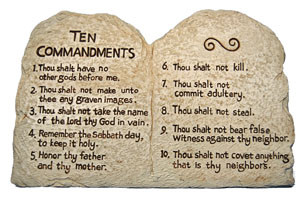One of the greatest errors of dispensationalism has passed to a wider audience of evangelicalism. It has become to claim that the moral law is not authoritative for the Christian. Except when quoting Leviticus 18:22 in conversations regarding homosexuality, the evangelical will dismiss quotations from the Pentateuch with a dismissive, "That's Old Testament," or "We're under grace, not under law."
But, wow, do those same evangelicals turn mean when you cite particular examples in the New Testament of apostolic application of those laws. I have already discussed Paul's application of a law from Leviticus (and repeated in Deuteronomy) to the church at Corinth (I Corinthians 5:1).
I want to bring up another example today. In I Timothy 5:18, Paul write, "For the Scripture says, 'You shall not muzzle an ox when it treads out the grain,' and, 'The laborer deserves his wages.'" And in I Corinthians 9:9, he writes again to the church at Corinth, "It is written in the Law of Moses, 'You shall not muzzle an ox when it treads out the grain.' Is it for oxen that God is concerned?" So, from where does that quotation come? From Deuteronomy 25:4 (his other quotation to Timothy is from Luke 10:7). That is an Old Testament law.
These usages should make it clear that the doctrine of the dispensationalists and the attitude of evangelicals toward the Old Testament moral law is not that of the Apostles. The Apostles took Jesus at His word: "Do not think that I have come to abolish the Law or the Prophets; I have not come to abolish them but to fulfill them. For truly, I say to you, until heaven and earth pass away, not an iota, not a dot, will pass from the Law until all is accomplished. Therefore whoever relaxes one of the least of these commandments and teaches others to do the same will be called least in the kingdom of heaven, but whoever does them and teaches them will be called great in the kingdom of heaven" (Matthew 5:17-19).


No comments:
Post a Comment